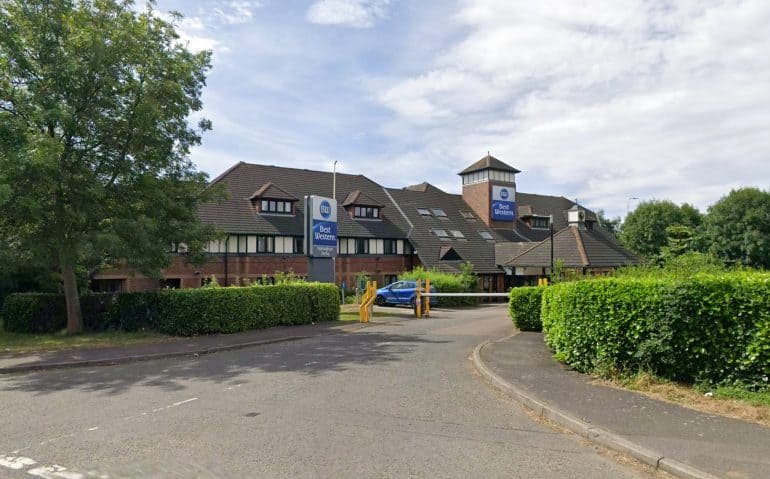-
 play_arrow
play_arrow
Erewash Sound Love Music - Love Erewash
-
 play_arrow
play_arrow
Free essential digital skills course starts in February - Olujuwon Omotoba Erewash Sound
Study reveals Derbyshire’s multi-million pound borrowing debt during worrying time for UK councils
today29 August 2025 20
Derbyshire has seen an overall combined increase in borrowing debt of over £27m across the county’s principal councils in a year, according to a BBC analysis of Government data, which shows a worrying rise in local authority debt.
A BBC Shared Data Unit team’s analysis of information from the Ministry of Housing, Communities and Local Government has found the combined borrowing for the 382 councils across the UK has now reached over £122.2 billion owed to lenders and it rose by seven per cent last year, or £7.8bn, when comparing the 2023-24 and 2024-25 financial years.
The position for Derbyshire’s councils is by no means the worst overall by comparison with many others, according to the analysis, but Derby City Council has seen a £23,574,000 increase in debt from £564,335,000 in 2023 to £587,909,000 in 2024 – the equivalent of a 4.37per cent rise.
NE Derbyshire District Council has seen a debt of £142,809,000 in 2023 increase by £18,496,000 to £161,305,000 in 2024 – an equivalent of a 12.95per cent rise – but it has argued that nearly all of this relates to Housing Revenue Account debt without which its debt can be judged as ‘negligible’.
Jonathan Carr-West, of the Local Government Information Unit, said: “I think the reason that councils are in financial trouble is because we have systemically underfunded Local Government for the past 15 years.
“We’ve created a system in which there is not enough money in the sector and in which councils have become reliant on their own ability to generate money, whether through local taxes or through return on investment.”
The analysis from the Government data shows UK councils owe more than a combined eye-watering £122,234,192,000 to lenders – the equivalent to £1,791 per resident, as of April 2025, the close of the financial year, from £114.5bn a year ago at £1,677 per resident.
But the BBC study says this rise in borrowing debt has been driven by short-term lending from Central Government which in some cases has had to be used to support council revenue budgets rather than pay for investments and town centre improvements.
Many councils have said they have had to invest to fill the gap in income they previously received from Government under the Revenue Support Grant, according to the BBC study.
Since 2020, six councils in the UK have had to issue section 114 notices declaring themselves effectively bankrupt including Croydon, Slough, Thurrock, Birmingham, Woking and Nottingham.
In June, Prime Minister Sir Keir Starmer announced a planned overhaul of council central grant funding to simplify the complicated funding formula used to distribute funds with plans to redistribute grants to focus on the most deprived areas.
The Government has stated that £3.4bn is to be delivered to councils between 2026-27 and 2028-29 on top of £69bn already made available for 2025-26 which is the equivalent of a 6.8per cent cash terms increase in councils’ core spending power on 2024-25.
Derbyshire’s relevant councils in the study include: Amber Valley Borough; Bolsover District; Chesterfield Borough; Derbyshire Dales District; Erewash Borough; High Peak Borough; North East Derbyshire District; South Derbyshire District; Derby City; And Derbyshire County.
But despite a combined increase in debt of £27,477,000 in a year – the equivalent of a 4.58per cent rise – Derbyshire’s councils do not feature near the top ten councils in the UK with the worst debt by the end of the 2024-25 financial year.
These include a top three of Birmingham with £3,352,457,000, Leeds with £2,640,673,000, and Woking with £2,155,641,000.
Also, Derbyshire’s councils do not feature among 30 councils who have had to seek exceptional financial support from the Government in 2025-26 and they do not feature among the top ten councils with the largest rises in overall debt.
Some of Derbyshire’s councils appear to be better off than most in the UK, according to figures released in the BBC study, and appear to be managing their finances well despite any existing debts and the difficulties faced by all the UK’s councils.
Derbyshire County Council’s £402,674,000 debt in 2023 has actually come down by £1,245,000 to £401,429,000 in 2024, according to the study.
The study also reveals Chesterfield Borough Council’s £137,818,000 debt from 2023 has decreased by £6,067,000 to £131,751,000 in 2024.
Bolsover District Council’s £88,533,000 debt from 2023, according to the study, has also decreased by £7,763,000 to £80,770,000 in 2024.
Amber Valley Borough Council and Erewash Borough Council, who were among 32 councils with no borrowing on their books at the end of 2024-25, according to the study, both have a recorded debt position for 2023 of 0 per cent, and 0 per cent for 2024.
Erewash Borough Council Leader James Dawson said: “It is no secret that times have been tough for cash-strapped local authorities – but here in Erewash we have been laser-focussed on our priority of putting local people first.
“It has taken robust financial stewardship – plus some hard decisions – to keep the council from going into the red. But our mission to remain debt-free is now paying off after residents put their trust in us.
“Just weeks ago the council was in a position to reveal it is ploughing a massive £2m into improving the lives of people in the borough. The boost is in the form of new Erewash Investment Fund, which we have been able to launch while other councils are struggling.”
The study also reveals Derbyshire Dales District Council has stayed static with a debt of £5,450,000 in 2023 and 2024.
High Peak Borough Council has only seen a £500,000 debt increase from £63,777,000 in 2023 to £64,277,000 in 2024, according to the study, and the study reveals South Derbyshire District Council has seen its debt of £37,512,000 in 2023 reduced by £18,000 to £37,494,000 in 2024.
However, experts including Mr Carr-West of the Local Government Information Unit said the spiralling levels of debt at local authorities across the UK were ‘extremely worrying’.
Mr Carr-West said: “We now have around 30 councils receiving emergency financial support, exceptional financial support from the Government. When people talk about that, they often think that’s money from Government – it’s not.
“That exceptional support is about changing accounting rules so that you can sell off assets more easily and so that you can use borrowing to fund some elements of revenue.
“That is not a sustainable system. As one Local Government finance officer said to me, it’s essentially payday loans for Local Governments.
“I don’t think the Government would say that’s it’s long-term ambition. They would say that is what we have had to do to paper over the cracks while we introduce a new funding system for Local Government.
“Now, the billion dollar question is whether the changes the Government’s making around multi-year settlements and a new funding formula make enough difference.”
Mr Carr-West highlighted that many councils across the UK are selling assets off to repay their debts with concerns that public value is passing into private hands and it will not come back.
He added: “Maybe the situation is so desperate that they do need to do that in order to keep their heads afloat. But again it’s not a long term way to to think about public funding, public services and generating public value. It’s a short term fix with very long-lasting implications.”
Mr Carr-West also pointed out the additional complication of the Government’s Local Government Reorganisation plans to introduce single, unitary councils by merging district, borough, county and potentially city councils in two-tier areas like Derbyshire that currently operate with district and borough councils, and then a county council.
He questioned what will happen to the debt and assets under the changes and whether the debt will risk making any new unitary council financially unsustainable.
Sarah Calkin, Editor of the Local Government Chronicle, believes very few senior finance officers or chief executives would say the current system is sustainable and that there will be winners and losers under funding reforms which will change the way money is distributed around the system.
She added the new multi-year settlement arrangements will help give councils a longer view over a longer period to manage their budgets.
Ms Calkin said overall it comes back to the point funding is not adequate to meet the demand across a range of services for the most vulnerable in society from adult social care to children’s services, to education for children with special educational needs and disabilities or for housing and homelessness which are all seeing big rises in demand pushing up councils’ costs.
A Ministry of Housing, Communities and Local Government spokesperson said: “While councils are responsible for managing their own budgets, we know that the current funding system is broken which is why we are taking decisive action so local leaders can deliver the public services their communities rely on.
“We have announced over £3.4bn of new grant funding for local services on top of the £69bn already made available this year to boost council finances, and we will go further to reform the funding system, including at new unitary councils, to ensure it is fit for the future.”
Concerning NE Derbyshire District Council’s borrowing debt figures, a council spokesperson said: “The Housing Revenue Account debt makes up 95per cent of the council’s total debt with less than only £7m relating to the General Fund.
“This is not recognised in the publicly available measure of debt v net revenue spend, with revenue spend only taking into account General Fund expenditure.
“If the HRA debt is separated out then our percentage debt to Net Revenue Expenditure on the General Fund is negligible.”

Written by: Erewash Sound
Similar posts
Sponsors
ON AIR
SEARCH
CATEGORIES
RECENT POSTS

‘Sticking plaster’ support plan for pubs neglects other sectors says Chamber

Are you a member of the Ockbrook School Alumni?

Derby adult club saved from closure after crunch meeting

Derbyshire County Council drops core net zero commitment, shifting towards economic benefits and production

Erewash Sound and The Crockers DJs present ‘Decades of Dance’ – Saturday 4th April
103.5 & 96.8 FM
LOVE MUSIC
LOVE EREWASH
Office: 0115 888 0968
Studio: 0115 930 3450
Erewash Sound, The Media Centre, 37 Vernon Street, Ilkeston, DE7 8PD
© Copyright 2026 Erewash Sound CIC. All Rights Reserved. Company Number 6658171.






